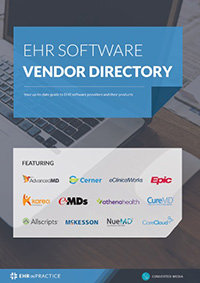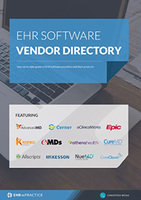What the 21st Century Cures Act means for the EHR market
In a rare act of bipartisan consensus on Wednesday December 7, 2016, the U.S. Senate passed the 21st Century Cures Act by a vote of 94 to 5 which followed a 392 to 26 House vote just over a week earlier approving the measure after years of being in legislative purgatory. It will now head to the President, who has indicated he will sign it into law.
The largest legislative action in healthcare since the Affordable Care Act, the Act contains $6.3 billion in funding over 10 years to the National Institutes of Health (NIH) for the Precision Medicine Initiative, Cancer Moonshot, BRAIN Initiative, and regenerative medicine using adult stem cells.
Of interest to EHR vendors and consumers, the Act’s most significant impact on the EHR market rests in the provisions favorable to the further development of the EHR market by proposing measures to encourage greater interoperability and deter the practice of information blocking.
Anti-information blocking measures in the 21st Century Cures Act
One of the main challenges to the full realization of EHR’s potential rests in barriers to the sharing of health information. The Act addresses one of the primary culprits which underlie EHRs’ interoperability problem - the practice of ‘information blocking’, or placing technological or non-technological barriers into HIT which prevent the sharing of data. The Act further and attempt to eliminate what ONC identifies as “strong incentives to exercise control over electronic health information in ways that unreasonably interfere with its exchange and use, including for patient care.”
Find interoperable EHRs using our comprehensive EHR vendor directory
The 21st Century Cures Act formally defines the practice as “to prevent or materially discourage the access, exchange, or use of electronic health information; and “the actor knows or should know are likely to interfere with the access, exchange, or use of electronic health information.” The Act defines this as including the following:
- Implementing contract terms, policies, or business or organizational practices that restrict the lawful authorized exchange of health information including transitions between certified EHR technologies.
- Charging unreasonable prices or fees that make accessing, exchanging, or using electronic health information cost prohibitive.
- Developing or implementing health information technology in nonstandard ways that are likely to substantially increase the costs, complexity, or burden of sharing electronic health information.
- Developing or implementing health information technology in ways that are likely to lock in users or electronic health information.
Identifying and penalizing information blocking
The law also authorizes the Office of the National Coordinator for Health Information Technology at HHS to penalize vendors, health care providers, or health information system providers that engage in information blocking. Violations that occur after January 1, 2018 can be subject to civil monetary penalties.
Certification and decertification
The Act further weaves interoperability standard into the EHR certification process by stating that that EHR certifications made on or after January 1, 2018, must certify that the technology is interoperable as defined by the standard for interoperability in the Act. Beginning January 1, 2019 any products that are unable to meet the interoperability standard contained in the law will decertified.
The 21st Century Cures Act offers a significant and much needed step toward facilitating the more efficient exchange of health information through the vehicle of a “my way or the highway” approach that, if implemented as intended should improve the prospects of more widespread interoperability in the next few years.
Free white paper

EHR Vendor Directory
Get the most up-to-date directory of EHR software vendors. Find the best software for your practice.

Featured white papers
Related articles
-

EHR interoperability challenges and solutions
Why EHR interoperability is important, and how to improve it
-

Top ophthalmology EHRs for your selection shortlist
Got your eye on a new ophthalmology EHR? Here are some top contenders.
-

Allscripts acquires Practice Fusion: what this means for users
What effect will Allscripts' Practice Fusion acquisition have on the EHR market



